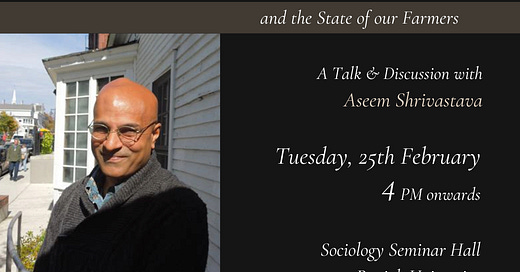A Conversation in Chandigarh: The Idea of Development
...and the state of our farmers— with Aseem Shrivastava
Whether in electoral rhetoric or in the most high profile Supreme Court cases or in public policy, the word on everyone’s lips is Development. Punjab’s labour laws have been proposed to be reformed for– Development. Schools are being set up and strengthened for– Development. Building regulations are being changed so that rural areas and urban centers can be brought– Development. Industries are being offered expedited clearances to facilitate ease of doing business for the sake of– Development. Vast highway networks are being constructed for– Development. On the one hand, we have the buoyant optimism of Development which promises an ever brighter future.
On the other hand is the social-ecological-political crisis, perhaps most visibly symbolised by the marching and fasting farmers. Two years after the farmers' protest at the borders of the Capital was called off, the farmers and the State are no closer to resolving their growing conflict. Farmers have been protesting again for the last one year at the Shambu and Khanauri borders. Sixty years after the Green Revolution was brought to Punjab, our soils are infertile and ground water is toxic in twenty districts, with a ‘Cancer Train’ running weekly from Bathinda to treat people in Bikaner. Punjab’s forest cover is down to just three percent. Farmer incomes have been declining relative to the incomes of the rest of society at least since the ‘90s. Two months ago, fed up with the hazardous sludge flowing to their farms, farmers and concerned citizens marched to Ludhiana to stop industries from dumping their chemicals into the once serene but now lethally toxic stream, the Buddha Nala.
So what does this word, ‘Development’ really mean and how come everyone is talking about it? Where did this idea come from and how has it become the consensus of our times across party lines and across various walks of public life? Which are the institutions involved in Development? On a related note, are we moving closer to resolving our most pressing problems? Have we confronted the roots of our society’s deepest fractures? Can the idea of Development address our concerns? Join us for a conversation as we discuss these matters with writer, teacher and philosopher, Prof. Aseem Shrivastava on 25th February, at Panjab University, Chandigarh.
Prof. Aseem Shrivastava holds a doctorate in Economics from the University of Massachusetts, Amherst. He has taught Economics and Philosophy including stints at St. Stephens, Williams College, UWC Pune, Nordic College and most recently Ashoka University, where he taught Ecosophy. He is the author (with Ashish Kothari) of the books ‘Churning the Earth: The Making of Global India’ and ‘Prithvi Manthan’. He is currently at work on a number of books including the upcoming title: ‘The Grammar of Greed: Reflections on a Fatal Ecology’.
Aseem Shrivastava is a writer, teacher and ecological thinker with a doctorate in Economics from the University of Massachusetts, Amherst. He has taught at universities in India and the West, and has offered over several years courses on Global and Indian Ecosophy at Ashoka University. He has lectured across the world on ecological issues emanating from globalisation. He has been guiding and mentoring a number of graduate students and young people working in the realms of Philosophy, Ecosophy, Ecology, and Political Economy. He is the author (with Ashish Kothari) of the books Churning the Earth: The Making of Global India , and Prithvi Manthan. He is currently at work on several books on Ecosophy that dialogue with the ecological challenges of 21st century global modernity, including the upcoming title: ‘The Grammar of Greed: Reflections on a Fatal Ecology’.



